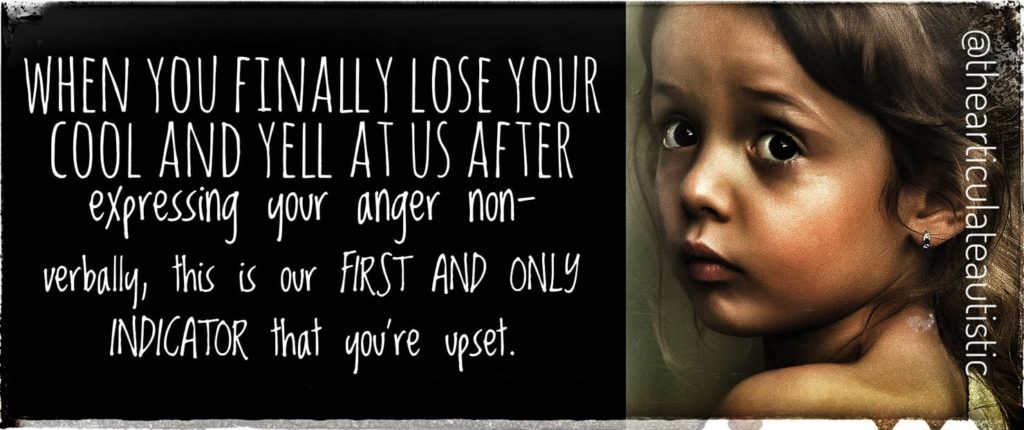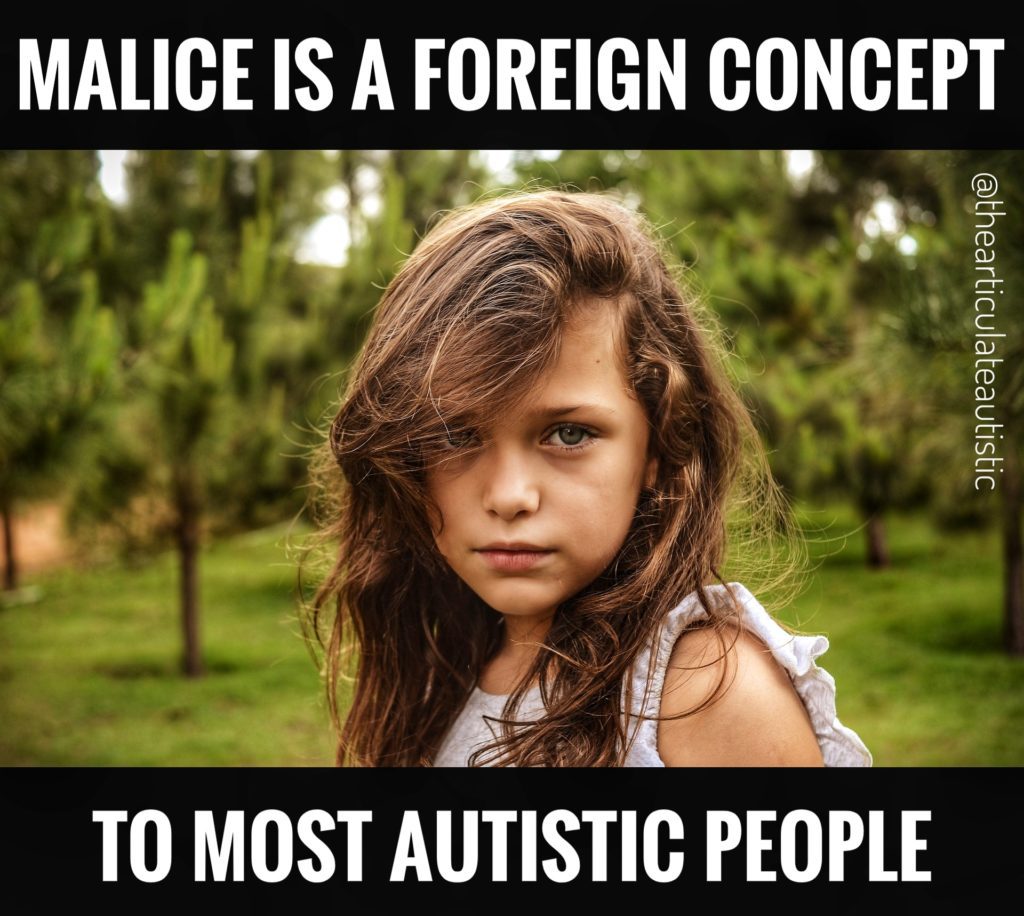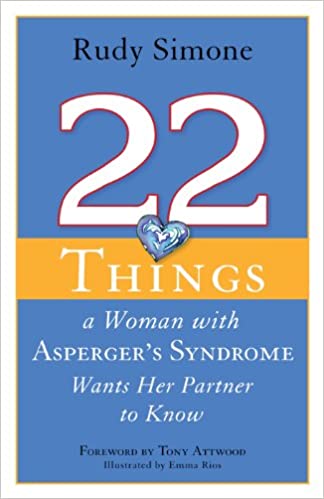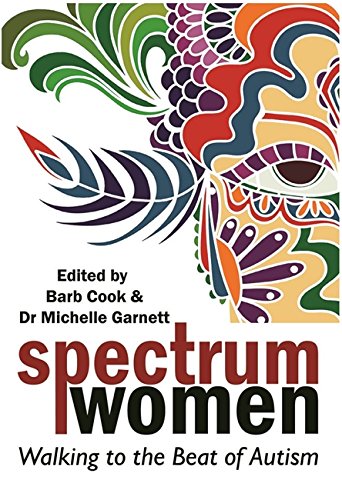When You Finally Lose Your Cool and Yell at Us After Expressing Your Anger Non-Verbally, This Is Our FIRST and ONLY Indicator That You’re Upset

In keeping with the theme of needing specifics when it comes to household chores and emotional interaction, let’s talk about the darker side of NT to ND miscommunication: Yelling.
This is something that hit me like a ton of bricks one day while I was just minding my own business, eating.
I don’t know how or why, but it suddenly, at about age 26, dawned on me that the sudden yelling in my face I experienced as a child wasn’t the FIRST time someone was expressing their displeasure, it was the FINAL time!
Meaning, the adults around me had indicated with their facial expressions and body language that something was wrong, but I didn’t pick up on ANY of it!
So, it must have seemed to them that I was ignoring them completely until they were screaming at me!
“Screaming and yelling is the only thing that seems to get through to you!”
– Most people in my life throughout my childhood
I heard that SO many times and didn’t understand what it meant. The ONLY thing?? But that WAS the only thing! No other attempts were ever made to teach me anything! (Or, so I thought.)
So, for NT people, there is a lot of “leading up” to yelling. It’s usually not the first tactic an NT uses to express displeasure. For ND people, yelling is the first clue we are getting that something is wrong.
Now, I’ll admit, before I figured this out, I thought the lot of you (NTs) were insane and just flew into random, blinding rages.
Because for me, everything would be fine and calm and peaceful, and then…
THERE WOULD SUDDENLY BE SOMEONE SCREAMING IN MY FACE AND ASSAULTING ME WITH THEIR BREATH AND VOICE AND SPIT!
It was like a bomb had dropped out of the sky!
(Article continues below.)
The best way to improve communication with your autistic loved one is to understand how your autistic loved one’s mind works! Intentions, motivations, and personal expressions (facial expressions or lack thereof, body language, etc.), are often quite different in autistic people than they are in neurotypical people.
Experience a better understanding of your autistic loved one by reading books about life from an autistic perspective as well as stories that feature autistic characters. You’ll have so many “Ah ha!” moments and start seeing your autistic loved one in a different light (and you’ll have a better understanding of their behaviors, which you may have been misinterpreting up until now).
Books I recommend for a better understanding of your autistic loved one:
Subtlety is lost on most of us, and what is “obvious” to you is simply NOT to us. Not only is it not obvious, it doesn’t exist!
Your repeated sighing or the crease between your brows isn’t even on our radar. It’s not that we don’t care, it’s just not information we can read.
I mean, you wouldn’t try to communicate with a blind person using sign language and then get upset when they don’t understand you, right?
It’s the same concept with autistics!
Can we learn to read facial expressions and body language? Yes, some of us can. However, most of us have learned by being repeatedly abused, and that’s the psychological equivalent of training a chihuahua with a cattle prod!
The best way to get us to understand your wants and needs is to tell us. You can also let us know what certain expressions mean. This helps us to make connections, and, as we get to know you, we’ll actually have a chance of learning you organically instead of being frightened into it.
And, if you still think, “I shouldn’t have to ask!” is an effective way to communicate with the ND person in your life, tell me, which is the man in the photo? Neurotypical or neurodivergent?
Because this type of miscommunication tears us both apart…equally.
For a more NT-friendly comparison, try this:
You’re sitting at home late at night, reading a book. Your spouse is in the kitchen making a cup of tea. Your cat is curled up in your lap, and there’s a nice breeze coming through an open window nearby.
In the time it takes to blink, there is a red and angry face looming over you, completely blocking your vision and shrieking in a language you’ve never heard before. With horror, you realize it’s your spouse, and they want you to do something NOW, or the yelling will just get louder, but you can’t even think for the terror you feel.
THAT is what it’s like for us. This is why it is so important to catch our attention, be sure we are focused on you, tell us specifically what you want us to do or what we did wrong and why (don’t ever forget the “why”) it was wrong, and what we should be doing instead. Then, check for understanding.
Make sure we are both on the same page about what is expected of us before completing the conversation.
Yelling and screaming doesn’t make autistic people “get it” any faster. It might light a fire under your NTs behind, but it just gives us PTSD.
Follow me on Instagram.
Want downloadable, PDF-format copies of these blog posts to print and use with your loved ones or small class? Click here to become a Patreon supporter!












4 Responses
[…] where you blow your top because you just can’t take it anymore, is when us autistic get our VERY FIRST CLUE that something is […]
[…] a hard truth for my neurotypical followers: When you start crying or yelling, it is often our FIRST INDICATOR that something is […]
[…] I’ve said in previous posts, your last straw is often our first clue that anything is wrong. We haven’t been ignoring you this whole time, we just can’t understand your […]
[…] By and large, neurotypical people indicate their feelings in an indirect way so as not to appear rude or aggressive. However, that often backfires because, eventually, when these subtle ways of communicating appear to be “ignored” (by autistic or otherwise neurodivergent people), they tend to blow up in anger and frustration, which can seriously traumatize an autistic person because your last straw is our first clue that something is wrong! […]